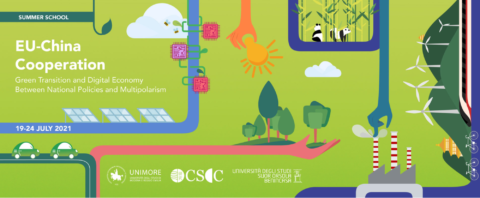Summer School Experiences
In July 2021, some SDAC students participated in a week-long Summer School “EU-China Cooperation. Green Transition and Digital Economy Between National Policies and Multipolarism,” which is co-organized by the University of Modena and Reggio Emilia, Centro Studi sulla Cina Contemporanea (CSCC), University Suor Orsola Benincasa, and Shanghai Jiaotong University. After participating, students shared their experiences with us enthusiastically.
- How do you like and benefit from Summer School?
- Personally, I found this experience very valuable and interesting for my personal growth and to meet other people with the same academic interests and concerns. The multicultural environment made for a nurturing dialogue of diverse points of view. It also allowed me to significantly expand my contact network and meet a group of excellent academics and future professionals of a high level. In addition, attending this remarkable event also helped me to considerably increase my knowledge and interest in strategic areas such as green transition, sustainable future, renewable energies, alternative means of energy production and transport, among others. Also, the access to specific bibliography and institutions linked to the study of these issues in China and Europe has been a very valuable plus. It was an excellent opportunity!
— Baltazar
-
- The interdisciplinary curriculum of the summer school allowed me to have a rich dialogue with experts in the field of green transition and digitalization. I am not only impressed by speakers’ brilliant and high-quality presentations, but enjoyed exchanging thoughts with peers during discussion sessions. I especially like one session, Prof. Taube from the University of Duisburg-Essen applied game theory to analyze Sino-European Economic relations. Strikingly, EU-China cooperation has gradually shifted from a win-win situation to a competitive win/loser landscape with a hidden Thucydides Trap. The speakers have very diverse backgrounds ranging from environment protection activists from China and economics researchers, to researchers with experience in the semiconductor industry of Taiwan. They all shared different perspectives on the topic and encouraged reflexive thinking. Overall, I really enjoyed my time at the summer school. I gained many new insights and learned a lot for my future research and career. To all future students: If you have the chance to participate in the summer school. Take it! You will not regret it.
— Shih Ju
- What’s your favorite activity?
- The activities were divided into three main areas: Keynote lectures, group discussions and open debates with the speakers (Questions and Answers). Each of these activities worked perfectly beyond the difficulties of organising an event of this magnitude absolutely online. Personally, I enjoyed every one of them and all the speakers left me with a very positive feeling. Probably if I had to choose Dr. Yu Jie’s analysis of innovation strategies and Chinese environmental policies in the 14th five-year plan, Dr. Ma Jun’s lessons on what we can learn from China to fight pollution and Prof. Li Daitan’s notions of AI and the fourth industrial revolution were my favourites.
— Baltazar
- What are some of the challenges?
- The common question throughout the course has no longer been “What do we do” but rather “How do we do it? And after witnessing the great advances in legislation and international agreements, green technology and sustainable alternatives, I am convinced that the future challenge for humanity is to place the environment and sustainable development at the top of domestic and international political agendas. Likewise, the existing instruments must be given greater coercive power to move from being mere declarations of good intentions to being an unavoidable roadmap towards a common good. Climate change and natural disasters warn us year after year that if we do not act immediately, perhaps it will be too late. It is up to us as a global community to put pettiness aside and think about the future of our race and our planet.
— Baltazar

